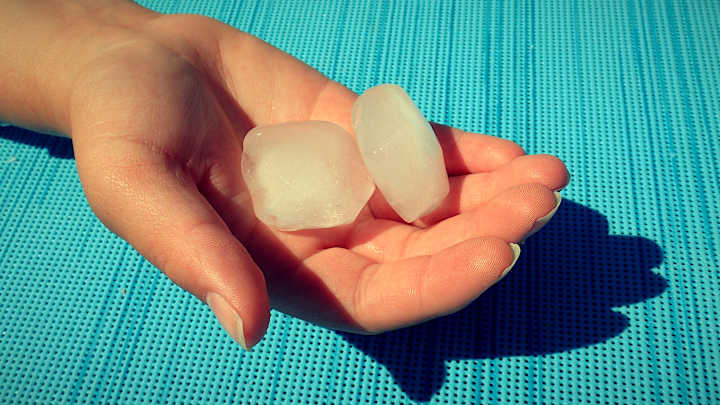Does the TikTok Vagus Nerve Hack Really Work?

TikTok always seems to be at the forefront of the latest trends, from the heatless waves wrap to dance moves. But a recent craze described as the vagus nerve ice hack caught my attention. Basically, if you're feeling anxious or stressed, you place an ice pack on your chest for 15 minutes, and the intense feelings will dissipate. But does it actually work? I decided to give it a shot.
As someone who battles anxiety regularly, I found myself in particular panic at 11 p.m. the other night. My son wasn’t sleeping well, my phone wouldn’t charge (and therefore, I had no access to the baby monitor), and I was tense about some looming deadlines. So I went to the freezer, took out an ice pack, placed it on my chest, and laid in bed.
Incredibly, I started to feel better within minutes. My mind was still racing a bit, but I wasn’t having the physical symptoms of a racing heart. Less than 15 minutes later, I was asleep again. Was it the ice pack hack that helped? I can’t be totally sure. Having intentional decompression time could have been part of the de-stressing process as well, much like meditation. But there is medical evidence that the TikTok trend does help.
First, a little background. The vagus nerve is the longest nerve in the body, extending from the brainstem down to the abdomen and pelvis. Activation of the vagus nerve stimulates the Parasympathetic nervous system, often referred to as “rest and digest.” Explains Dr. Scott Braunstein, medical director at Sollis Health in Los Angeles, “It relaxes bowel muscle, blood vessel tone, bronchial constriction, slows heart rate, and lowers blood pressure.”
There are many medical uses of stimulating the vagus nerve, including treatment of arrhythmias (often treated by massaging the carotid artery region of the neck), depression and epilepsy (devices are implanted to stimulate the nerve). You can also place an ice pack on the orbital region—near the eyes—to stimulate the vagus nerve, causing a slowing of the heart rate.
Timely fact: Russian skater Kamila Valieva may be disciplined by the International Olympic Committee for allegedly testing positive for the banned medication Trimetazidine. “This is thought to possibly provide an athletic advantage, though it’s stimulation of the vagus nerve, relaxing airways and muscle, and potentially facilitating a more rapid recovery from stress or exertion,” says Braunstein.
Medically it’s already been proven that stimulating this nerve can help with various issues. And medical professionals are now seeing the benefits of the ice pack hack being touted on TikTok. Says Braunstein, “Some people have been purposefully stimulating their vagus nerve, to reduce anxiety or treat panic attacks, based on its ability to lower heart rate and relax smooth muscles.”
So, whether my own experiment reduced my anxiety because the ice cube was actually stimulating my vagus nerve, or was just my decompression time in the room alone, I think there’s enough evidence here for me to give it a go a few more times.

Jordi Lippe-McGraw is a Contributing Editor for SI Swimsuit covering all things lifestyle from travel and beauty to entertainment and wellness. Over her nearly 15-year-long journalism career, her work has appeared in the New York Times, WSJ Magazine, Forbes, and more. Plus, she’s appeared on TV shows such as Wendy Williams, TODAY, E!, and MSNBC for her expertise. Jordi's personal passion for travel has brought her to over 50 countries on all 7 continents, including Antarctica at 5 months pregnant. She's also an avid penguin and truffle lover.